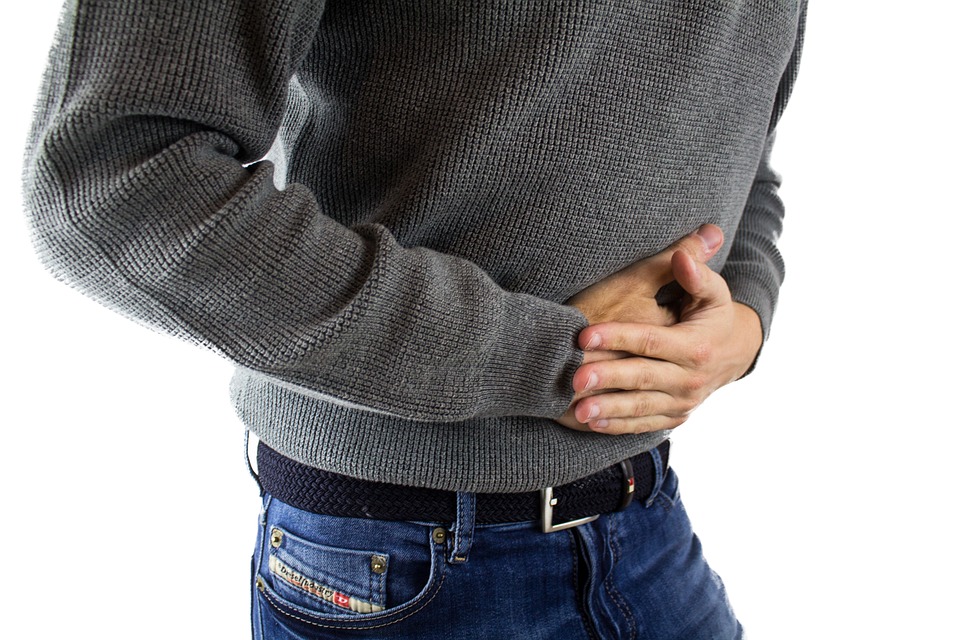Bloating can cause discomfort, but there are many ways to reduce it. Exercise, supplements, massage, dietary changes, and other strategies can all help reduce bloating quickly.
Why You’re Bloated
So, what is bloat, exactly?
A little nutrition 101 for you: Bloat is a buildup of gas in the abdomen, usually caused by digestion or swallowed air. Being bloated is a result of an overgrowth of bacteria in the small intestine. This bacteria ferments food, creating gas that causes bloating. In other words, you feel like you’ve been blown up like a balloon.
Water retention is similar to bloating. You know the feeling: You can’t get your rings on, and your eyes look like you’ve been in a brawl. This lovely (not!) symptom is usually caused by consuming foods high in salt (beware of processed foods). High levels of sodium cause your body to hold onto extra fluid.
Not only can bloating and water retention be uncomfortable and less than attractive, they can be downright painful. If you plan on debuting your new bikini but feel puffier than the Michelin Man, I’m here to offer tips for beating the bloat. My favorite anti-bloat foods and things to do can help with both of these troublesome problems.
14 Ways to Reduce Bloating
Many home remedies can help to manage the pain and discomfort of bloating. The following quick tips may help people to get rid of a bloated belly quickly:
1. Go for a walk.
Physical activity can get the bowels moving more regularly, which can help to release excess gas and stool. Getting the bowels to move is especially important if a person is feeling constipated. A walk around the block can provide fast relief from gas pressure.
2. Try yoga poses.
Certain yoga poses can position the muscles in the abdomen in a way that encourages the release of excess gas from the GI tract. This can reduce bloating.
Child’s Pose, Happy Baby Pose, and squats can all help people to relieve a buildup of gas quickly.
3. Use peppermint capsules.
Peppermint oil capsules may also be helpful for indigestion and related gas. Manufacturers usually market them as a treatment for the symptoms of irritable bowel syndrome (IBS), but people without IBS can also use them to relieve bloating.
Peppermint works by relaxing the intestinal muscles, which allows gas and stool to move along more effectively. People should always follow the instructions on the packet. Anyone who is prone to heartburn may need to avoid peppermint.
Peppermint capsules are available to buy over the counter (OTC) at drug stores or online.
4. Try gas relief capsules.
Simethicone pills and liquid are anti-gas medications that can help to move excess air out of the digestive tract. It is essential to always take medication according to the instructions on the label.
People can find gas relievers in drug stores or online.
5. Try abdominal massage.
Massaging the abdomen can help to get the bowels moving. A massage that follows the path of the large intestine is especially helpful. People can follow the steps below to do this:
- Placing the hands just above the right hip bone.
- Rubbing in a circular motion with light pressure up toward the right side of the ribcage.
- Rubbing straight across the upper belly area toward the left rib cage.
- Moving slowly down toward the left hip bone.
- Repeating as necessary.
If the massage causes any pain, it is best to discontinue it immediately.
6. Use essential oils.
A study from 2016 tested the effectiveness of supplements containing a combination of fennel and curcumin essential oil in 116 people with mild-to-moderate IBS. After 30 days, people reported an improvement in their IBS symptoms, including bloating and abdominal pain.
People should not consume essential oils without speaking to a doctor first. This is because some formulations may be toxic or can interfere with medication, and there is no regulation of dosages.
7. Take a warm bath, soaking, and relaxing.
The heat of the bath can provide relief for a sore abdomen. Relaxation can reduce stress levels, which may allow the GI tract to function more effectively and help reduce bloating.
Long-Term Solutions for Bloating
Quick fixes are not always effective for some causes of bloating. However, people who have frequent bloating may find that certain lifestyle changes can tackle the causes and reduce bloating over time.
People can use these simple steps to try to prevent bloating in the long-term:
8. Increase fiber gradually.
Eating more fiber helps to prevent constipation and bloating. Most people in America do not get enough fiber, with only 5 percent of people meeting their recommended daily fiber intake of 25 grams (g) for females and 38 g for males.
However, it is important to bear in mind that eating too much fiber or increasing fiber intake too quickly can cause even more gas and bloating. People may notice adverse effects from eating more than 70 g of fiber a day.
When increasing fiber intake, it is best to start slowly and increase the intake over several weeks to allow the body to adjust to this change in the diet.
9. Replace sodas with water.
Fizzy, carbonated drinks contain gas that can build up in the stomach. The carbon dioxide that makes soda and similar beverages fizzy can also cause bubbling and bloating in the stomach.
Sugars or artificial sweeteners in the diet can also cause gas and bloating. Drinking water eliminates these issues and helps to treat constipation as well.
10. Avoid chewing gum.
The sugar alcohols in gum can cause bloating in some people. Swallowing air while chewing also may lead to bloating and gas pain. People can use ginger mints or peppermints to freshen their breath instead.
11. Get more active every day.
Exercise helps your body move stool and gas out of the colon and may make bowel movements more regular. Exercise also releases extra sodium from the body through sweating, which can help to relieve water retention.
It is vital to drink plenty of water before and after exercising to stay hydrated, as dehydration can make constipation worse.
12. Eat at regular intervals.
Many people experience bloating directly after a big meal. It is possible to avoid this by eating several smaller meals each day, which can help to keep the digestive system moving.
Swallowing food quickly can introduce air into the digestive tract. Drinking from a straw can also lead to people swallowing more air, which in turn leads to gas and bloating. People who have bloating should avoid using straws if possible and try eating slowly to avoid swallowing air during meals.
13. Try probiotics.
Probiotics are good bacteria that live in the intestines. Taking a probiotic supplement may help to regulate the colon bacteria that can produce gas and cause bloating.
14. Cut down on salt.
An excess of sodium causes the body to retain water. This can cause a swollen and bloated feeling in the belly and other areas of the body, such as the hands and feet.
What to Eat When You’re Feeling Bloated
Asparagus
This long and lean veggie contains inulin, a prebiotic fiber that aids in digestion, promotes nutrient absorption and helps lower the risk of colon cancer. Add some lemon juice and fire up the grill to turn these tasty veggies into an easy and slimming side dish. Another fave is to simply blanch ’em and use as an in-between-meals filler instead of carrot sticks.
Avocados
This favorite green fruit has been shown to increase microbial diversity and support gut health. It’s an excellent source of potassium, folate, vitamin B6 and healthy fats. One-third of an avocado provides around 250 milligrams of potassium to help balance the bloat after eating a little too much salt or high-sodium foods.
Banana
Bananas are high in potassium, which can help balance out the fluid buildup that happens when you consume a lot of sodium. Less ripe bananas help contribute to the formation of short chain fatty acids (SCFAs) which promote good gut health.
Blueberries, Strawberries, Raspberries
These colorful berries are considered low FODMAP when you exercise portion control. In case you’re wondering, FODMAPs are difficult-to-digest carbs that can cause a slew of gastrointestinal symptoms in the millions of people with Irritable Bowel Syndrome (IBS). Strawberries are low in FODMAPs (they were recently reclassified from no FODMAP to having some), and contain antioxidants and fiber to help promote gut motility and alleviate inflammatory symptoms . (To explain why portion size sometimes matters with FODMAPs, there’s a threshold you hit when you eat a certain amount of a food that makes it “higher” FODMAP.)
Celery
These crunchy veggies act as diuretics, helping you to flush out the excess water you’re retaining. (Buh-bye, bloating.) Celery also has about 100 milligrams of potassium in every stalk and is a good source of fiber, vitamins C and K, and calcium. Pair that with its anti-inflammatory and antioxidant phytonutrients (such as luteolin and quercetin), and you have several excellent reasons to add more celery to your diet. Toss some in your salad for extra crunch or snack on celery with spicy salsa.
Citrus Fruits, Melons, Cucumbers
Citrus fruits such as oranges and grapefruit, melons such as honey dew and watermelon, and veggies such as cucumber and iceberg lettuce have high water content to help get things moving in your system and reduce the buildup and bloat.
These fruits and veggies are no slouches when it comes to nutrition either. Citrus fruits are not only high in immune-supporting vitamin C, but they’re also solid sources of fiber and low in calories.
With just 40 calories per cup, watermelon is particularly rich in lycopene (the antioxidant that lends it the lovely pink hue). This is good for your skin, heart and brain.
Iceberg lettuce has fiber, potassium, zinc, vitamin A and vitamin K, all while being very low in carbs and calories (10 calories for ? of a medium head of lettuce).
Cucumbers are wildly low in calories (30 calories per medium cucumber) and a good source of potassium, magnesium, fiber, and vitamins A and K.
Garlic
Garlic is known to have prebiotic compounds that help feed our gut, contribute to a diverse microbiome and promote healthy digestion. Although garlic doesn’t sit well with everyone (it does contain FODMAPs), for those who can tolerate it, garlic has been shown to reduce inflammation in the digestive tract. The allicin in garlic also acts as a natural diuretic.
Garlic, olive oil and lemon zest give these green beans just the right flavor and dose of nutrients.
Ginger
This anti-inflammatory root also has anti-spasmodic qualities. Studies show that it has de-bloating properties too. According to this review , ginger appears to be safe and its effects are mighty and amazing in its many applications. Try grating it into your favorite marinade, topping a simple piece of grilled fish to add a little zing, or add it to your lemon water.
Green Tea
The major phenolic compound in green tea known as catechin has been shown to relax the muscles in the gastrointestinal tract and has anti-oxidative and anti-inflammatory effects.
Kimchi, Kefir, Sauerkraut
Fermented foods like kimchi, sauerkraut and kefir are rich in probiotics and bioactive peptides which contribute to their digestive-supporting and anti-inflammatory properties. Kefir has over 35 strains of bacteria and yeast that help reduce inflammation and relieve your upset tummy.
Kiwi
Not only is kiwi a good source of potassium, zinc and fiber, it also contains actinidin . This enzyme may increase the gastric emptying rate, improve gastrointestinal motility (which is the movement of food through the digestive tract) and provide faster relief from feeling overly full. A small randomized trial has shown that two peeled kiwi per day improved chronic constipation and was better tolerated than other natural remedies (psyllium and prunes). Both green and gold kiwi are considered to be low FODMAP foods, which we know can be consumed without causing bloat for most individuals.
Peppermint or Chamomile Tea
These teas can help food to pass through the stomach and relieve gas. Dried chamomile flowers are packed with good-for-you plant compounds like flavonoids and can help relax intestinal muscles and reduce bloating. The key to peppermint’s bloat-busting success is likely thanks to a cooling compound found in its leaves: menthol. Menthol helps relax the intestinal tract and relieve bloating.
Sip on your choice of iced or hot tea with a slice or two of lemon or ginger. Or give bloat the boot with these other teas known to relieve GI symptoms.
When to See a Doctor
Although it is not common, bloating and swelling of the abdomen can signify a severe medical condition. Liver disease, inflammatory bowel disease, heart failure, kidney problems, and some types of cancer can cause bloating.
Bloating that continues for days or weeks may indicate a health issue that needs medical attention. It is advisable to speak to a doctor about ongoing bloating that does not go away over time.
People whose bloating occurs alongside these symptoms should seek medical advice:
- appetite changes or trouble eating
- diarrhea
- vomiting
- weight loss
- fever
- severe abdominal pain
- bright red blood in the stool
- black or dark maroon stools



